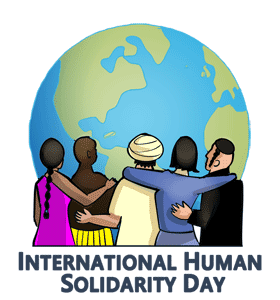

International Human Solidarity Day
Quick Facts - NZ
| HashtagsCompiled on | #InternationalHumanSolidarityDay, #SolidarityDay |
|---|---|
| Related Hashtags | #Solidarity, #FreePalestine |
| 2023 Date | 20 December 2023 |
| 2024 Date | 20 December 2024 |
2023 Holidays & Dates
| New Zealand & Common Holidays | ||
| Misc. & Int'l. Observances | ||
| Christian Holidays |
|
|
|
|
